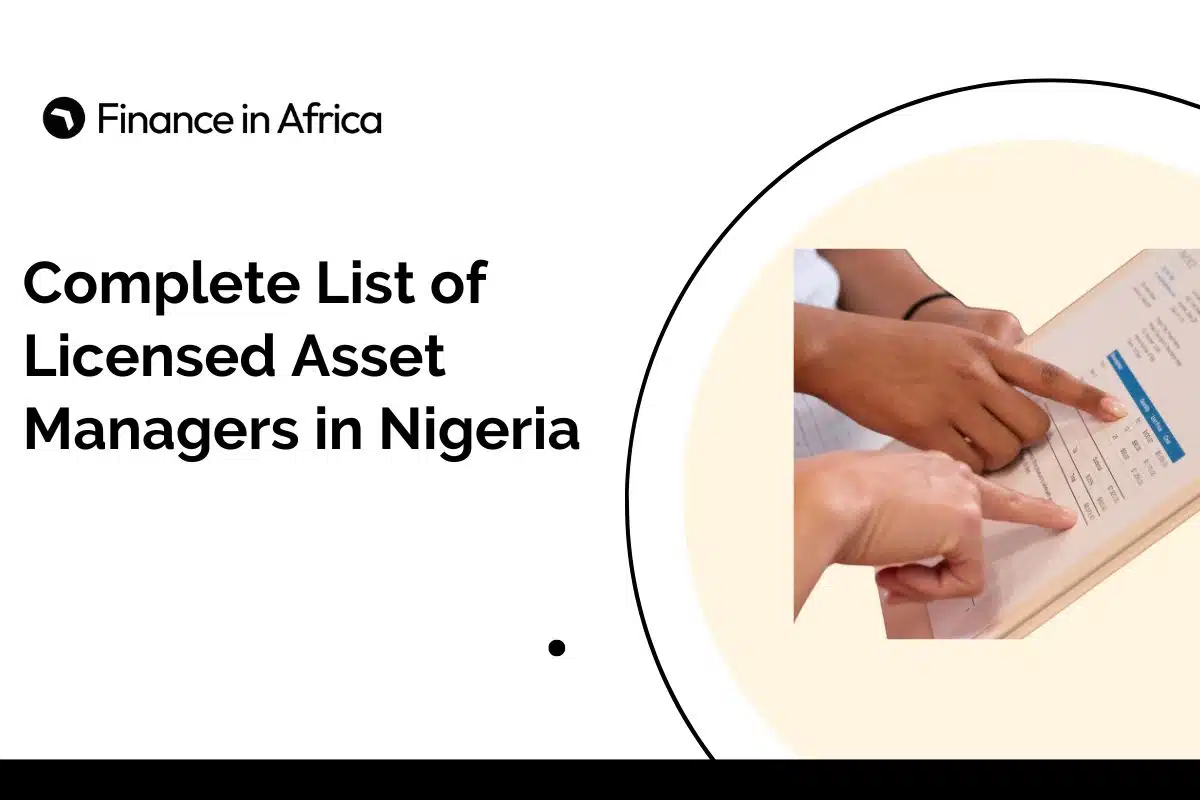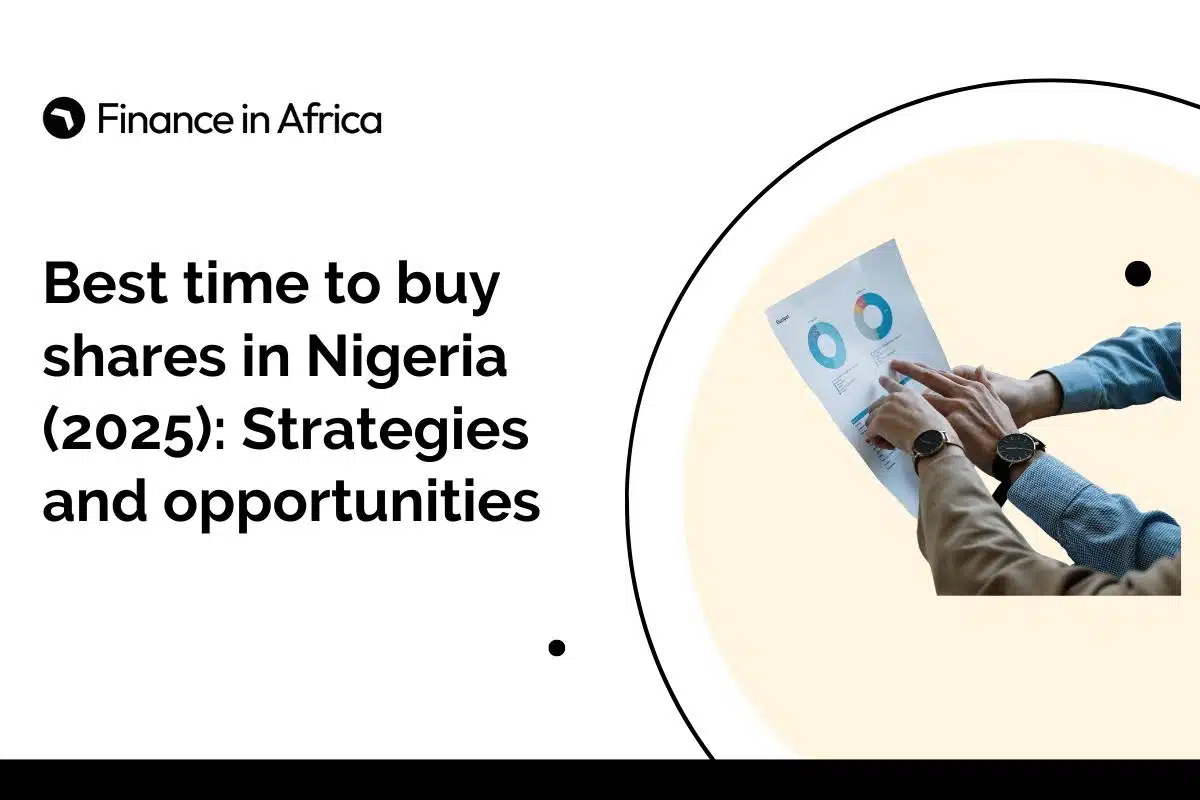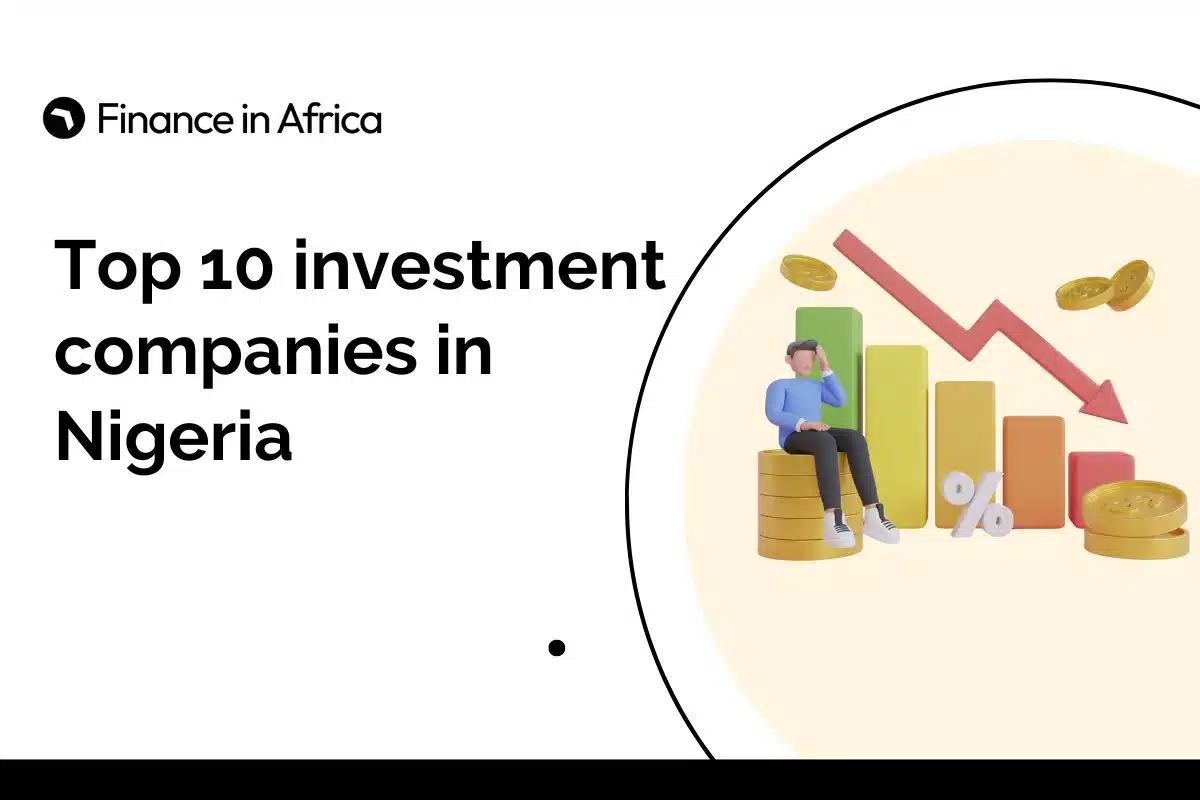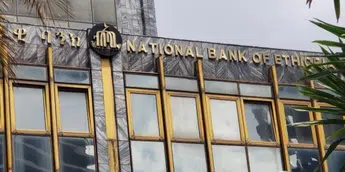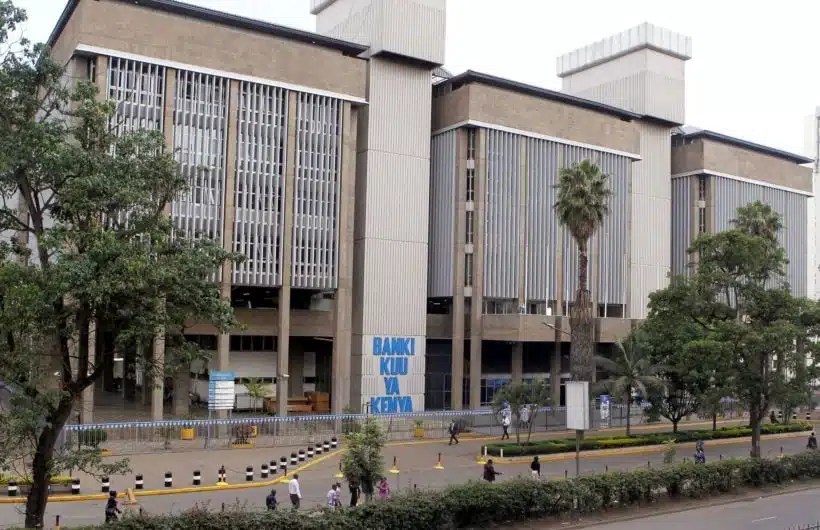Key takeaways:
- Nigeria’s asset management sector grew from ₦5.9 trillion in 2023 to ₦10.1 trillion in 2024, a 71.2% increase. It’s projected to reach ₦16 trillion by 2026. Alongside this growth, other investment institutions such as pension fund administrators are also rising in influence, as covered in our profile of top investment companies in Nigeria.
- The Nigerian SEC oversees all licensed firms. Departments like REMI and Investment Management Services handle registrations and supervise investment schemes.
- There are over 200 asset managers in Nigeria, but not all of them are licensed. Some firms operate in grey areas. Before trusting any manager with your money, make sure they’re registered with the SEC.
- Top asset managers in Nigeria by AUM include Stanbic IBTC, United Capital, FBNQuest, ARM Investment Managers Limited, Guaranty Trust Fund Managers Limited, AXA Mansard Investments Limited, Chapel Hill Denham Management Limited, Quantum Zenith Asset Management Ltd, and FSDH Asset Management Ltd.
- If you want to become a licensed asset manager in Nigeria, you need to meet the capital requirements, submit your company documents, appoint qualified individuals, and comply with SEC inspections and regulations.
It’s exciting to see how far Nigeria’s asset management industry has come. Especially considering the tough macroeconomic environment, the industry not only survived but also grew. Quietly, but impressively.
Between 2019 and 2023, Nigeria’s asset management industry recorded a compound annual growth rate (CAGR) of 21.9%, pushing total Assets Under Management (AUM) to ₦5.9 trillion by the end of 2023. By 2024, that number had jumped by a significant 71.2% to ₦10.1 trillion.
Segregated portfolios remained dominant, accounting for 57% of total assets under management, while collective investment schemes (CISs) accounted for 37%. Meanwhile, alternative investments, such as REITs and infrastructure funds, also experienced growth. This growth is driven by several factors, including increased retail participation, rising demand for dollar-denominated portfolios, and the ease of access offered by digital investment platforms.
With projections showing that the industry could reach ₦16 trillion by 2026, more people are becoming intentional and more cautious about who manages their money. Some managers now control a significant portion of total AUM, while others are rapidly advancing through the ranks.
As the industry grows, so does the need to distinguish between the truly licensed, SEC-compliant firms and those operating in the grey area. Because the truth is, not all asset managers are registered or fully aligned with SEC guidelines.
That’s why I’ve compiled a list of licensed asset managers in Nigeria, along with guidance on how to choose one. I also added some helpful context on licensing requirements, so you know what to look out for if you want to become a manager.
Whether you’re an institutional investor, a first-timer trying to figure out who to trust, or you simply want a clearer picture of the space, this guide is for you.
Understanding asset management: What you need to know
First, let’s define what an asset is. I like to think of it as anything that holds actual or potential value for whoever owns or benefits from it. In simpler terms, it’s a store of value, something you can eventually exchange for money or something else of worth.
Now, managing that store of value is where asset management comes in.
Asset management is all about developing, operating, and maintaining assets most cost-effectively. It involves acquiring, managing, and sometimes trading investments that have the potential to grow in value. The goal is to increase overall wealth over time.
Asset managers—an asset management company, sometimes referred to as an investment management company, refers to a firm that pools assets from retail investors and manages them according to clearly defined goals. Think of mutual funds and other collective investment schemes. These firms charge a fee to help you share in the benefits of diversification, liquidity, and expert-level management.
Assets can be either tangible (like buildings) or intangible (like intellectual property). Some of the key asset classes you’ll often come across include equities, commodities, bonds, futures, derivatives, real estate, cash, cash equivalents, securities, and mutual funds.
To break it down:
- Equity-based funds: These primarily invest in Nigerian stocks, with some investments in foreign stocks, for long-term growth.
- Fixed income/bond funds: These focus on government bonds, corporate bonds, debentures, and Treasury bills, offering steady returns.
- Money market funds: If you want something low-risk, these invest in short-term, liquid securities like T-bills, commercial paper, and certificates of deposit.
- Balanced or mixed funds: These combine equities, bonds, and sometimes money market instruments to offer a mix of income and growth.
- Real Estate Investment Funds (REITs): These are income-generating real estate investments through listed schemes, without requiring direct property ownership.
- Exchange-Traded Funds (ETFs): You can find these listed on the Nigerian Exchange (NGX). They track indices such as gold and offer passive investment options.
- Shari’ah-compliant funds: These follow Islamic finance principles with no interest-based instruments or prohibited sectors. Options include Shariah-compliant equity, sukuk, and fixed-income funds.
- Private equity and venture capital funds: These funds invest in companies and startups.
The SEC regulatory framework in Nigeria for asset management
The Nigerian Securities and Exchange Commission (SEC) is the main body responsible for regulating and developing the Nigerian capital market.
Currently, Nigeria has over 200 asset management operators, all of which fall under the SEC’s regulatory scope. The SEC itself is structured into different directorates, each handling specific responsibilities.
Within the Operations Directorate is the Registration, Exchanges, and Market Infrastructure (REMI) department. It’s responsible for registering Capital Market Operators (CMOs), overseeing consultants, and supervising trading platforms. REMI’s core duties focus on registration, regulation, and supervision. This includes activities related to securities, commodities, digital and virtual asset exchanges, online FOREX platforms, custodians, collateral managers, and virtual asset service providers.
Another department within the Directorate is the Investment Management Services Department. It handles the review and approval of various investment schemes like unit trusts, real estate investment schemes, and private equity funds. Once these schemes are approved, the department continues to monitor and supervise them.
REMI is responsible for registering asset managers and other capital market operators, while the Investment Management Services Department handles authorization and oversight of investment schemes.
While these aren’t the only functions of the SEC, its authority and responsibilities have also been enhanced. In March 2025, a new Investments and Securities Act (ISA) 2025 was passed to replace the 2007 version. One of the updates is that the Act now officially includes virtual and digital assets under the definition of securities. This means cryptocurrencies are now formally recognized as securities by the SEC in Nigeria.
Why you should choose an SEC-licensed asset management company
The SEC’s goal isn’t just to regulate for the sake of control. Its focus also includes protecting investors like you. It does this through a system that provides for registration, rulemaking, and support tools like the Investors Protection Fund (IPF), which steps in when something goes wrong.
This type of protection is essential, considering that most capital market instruments are intangible. You can’t hold them in your hand or examine them like a product in a store. Each asset comes with its level of risk and potential return. That’s why working with a firm that’s registered with the SEC gives you an added layer of trust and transparency.
Here’s a quick breakdown of how the SEC protects you as an investor:
- Rulemaking
- Empowering self-regulatory organizations (SROs) and trade groups
- The Investor Protection Fund
- Market surveillance
- On-site and off-site inspections
- Investigations
- Enforcement and compliance actions
- Complaints management framework
- Regulatory reforms
Working with an unlicensed firm is a major red flag. The SEC cracks down on unlicensed fund managers and fake investment schemes, especially Ponzi operations.
Remember Nigerians’s estimated loss of about $6.1M based on total deposits on CBEX?
Even after the comeback, Nigeria’s SEC says CBEX is still unlicensed and its comeback stunt is shady.
When you invest through an unlicensed company, you’re stepping outside the protection of Nigerian law.
SEC licensing categories you should know
| License category | Minimum capital requirement | Core services |
| Fund/Portfolio manager | ₦150 million | Manages client portfolios in pooled and segregated accounts across equities, bonds, and money markets. |
| Private equity and venture capital company | ₦150 million | Focuses on early-stage growth capital |
| Investment adviser (Corporate) | ₦5 million | Offers institutional/corporate investment guidance; no direct fund management |
| Investment adviser (Individual) | ₦2 Million | Provides retail or personal investment advisory services |
| Trustees | ₦300 Million | Holds and safeguards assets for schemes per trust law |
Top asset managers in 2025 by AUM
Asset management is all about helping individuals and institutional clients like mutual funds manage their assets and portfolios effectively. I curated this table from the SEC update on registered mutual funds in Nigeria as of March 2025, grouped by asset classes.
These include:
- Equity-based funds
- Money market funds
- Bond/Fixed income funds
- Dollar funds
- Real estate funds
- Balanced funds
- Ethical funds
- Shari’ah-compliant funds
Tier 1 asset management companies (₦50+ billion AUM)
| S/N | Company name | Net asset value (₦) | License type | Number of funds |
| 1 | Stanbic IBTC Asset Management Limited | 2.31 trillion | Corporate Investment Adviser Fund/Portfolio Manager | 14 |
| 2 | FBNQuest Asset Management LimitedNote: this includes FBN Capital Asset Mgt. Limited | 649.94 billion | Corporate Investment Adviser Fund/Portfolio Manager | 7 |
| 3 | United Capital Asset Management Ltd | 616.78 billion | Corporate Investment Adviser Fund/Portfolio Manager | 9 |
| 4 | ARM Investment Managers Limited | 213.42 billion | Corporate Investment Adviser Fund/Portfolio Manager | 8 |
| 5 | Guaranty Trust Fund Managers Limited | 182.28 billion | Fund/Portfolio Manager | 6 |
| 6 | AXA Mansard Investments Limited | 124.84 billion | Fund/Portfolio Manager | 3 |
| 7 | Chapel Hill Denham Mgt. Limited | 106.16 billion | Fund/Portfolio Manager | 5 |
| 8 | Quantum Zenith Asset Management Ltd | 90.09 billion | Fund/Portfolio Manager | 4 |
| 9 | FSDH Asset Management Ltd | 61.96 billion | Corporate Investment Adviser Fund/Portfolio Manager | 5 |
Tier 2 asset management companies (₦10-50 billion AUM)
| S/N | Company name | Net asset value (₦) | License type | Number of funds |
| 1O | EDC Fund Management Limited | 49.68 billion | Fund/Portfolio Manager | 6 |
| 11 | Meristem Wealth Management Limited | 40.81 billion | Fund/Portfolio Manager | 4 |
| 12 | Cordros Asset Management Limited | 39.30 billion | Fund/Portfolio Manager | 4 |
| 13 | Lotus Capital Limited | 35.10 billion | Fund/Portfolio Manager | 3 |
| 14 | Norrenberger Investment & Capital Management Ltd | 34.35 billion | Fund/Portfolio Manager | 4 |
| 15 | Zedcrest Investment Managers Limited | 29.54 billion | Fund/Portfolio Manager | 3 |
| 16 | AIICO Capital Ltd | 20.67 billion | Fund/Portfolio Manager | 3 |
| 16 | SFS Capital Nigeria Ltd | 22.11 billion | Fund/Portfolio Manager | 3 |
| 18 | Coronation Asset Management Limited | 20.32 billion | Fund/Portfolio Manager | 5 |
| 19 | First City Asset Management Plc | 17.94 billion | Fund/Portfolio Manager | 3 |
| 20 | CardinalStone Asset Management Limited | 16.04 billion | Fund/Portfolio Manager | 3 |
| 21 | ValuAlliance Asset Management Limited | 11.28 billion | Fund/Portfolio Manager | 2 |
| 22 | RMB Nigeria Asset Management Ltd. | 10.73 billion | Fund/Portfolio Manager | 2 |
Tier 3 asset management companies (₦1-10 billion AUM)
| S/N | Company name | Net asset value (₦) | License type | Number of funds |
| 23 | Emerging Africa Asset Management Limited | 8.53 billion | Fund/Portfolio Manager | 4 |
| 24 | Afrinvest Asset Management Ltd. | 8.52 billion | Fund/Portfolio Manager | 3 |
| 25 | Growth & Development Asset Management | 4.54 billion | Fund/Portfolio Manager | 2 |
| 26 | Trustbanc Asset Management Limited | 4.53 billion | Fund/Portfolio Manager | 1 |
| 27 | PAC Asset Management Ltd | 4.44 billion | Fund/Portfolio Manager | 4 |
| 28 | Vetiva Fund Managers Limited | 4.14 billion | Fund/Portfolio Manager | 1 |
| 29 | STL Asset Management Limited | 3.30 billion | Fund/Portfolio Manager | 3 |
| 30 | Anchoria Asset Management Limited | 3.00 billion | Fund/Portfolio Manager | 3 |
| 31 | SCM Capital Limited | 2.62 billion | Fund/Portfolio Manager | 2 |
| 32 | AVA Global Asset Managers Limited | 2.49 billion | Fund/Portfolio Manager | 3 |
| 33 | Capital Express Global Asset Management Limited | 2.44 billion | Fund/Portfolio Manager | 2 |
| 34 | FUNDCO Capital Managers Limited | 2.32 billion | Fund/Portfolio Manager | 1 |
| 35 | Core Asset Management Limited | 1.62 billion | Capital Express Global Asset Management Limited | 2 |
Top asset managers in Nigeria
Stanbic IBTC Asset Management Limited
Stanbic IBTC Asset Management Limited is a subsidiary of Stanbic IBTC Holdings. Since its inception, it has grown into one of the most prominent asset management firms in Nigeria. By 2023, the firm crossed ₦1 trillion in assets under management (AUM).
It’s licensed by the SEC as a fund and portfolio manager. Stanbic IBTC Asset Management offers a wide range of services, including mutual funds (covering money market, equity, and bond funds), exchange-traded funds (ETFs), portfolio management, and advisory services.
United Capital Asset Management Limited
United Capital Asset Management Limited is a subsidiary of United Capital Plc. By June 2025, the firm crossed ₦1 trillion in total AUM, including over ₦500 billion in mutual funds.
It’s licensed by the SEC as both an investment adviser and a portfolio manager. The company manages mutual funds such as equity, balanced, and money market funds. It offers portfolio management tailored to both corporate and individual clients. It also offers financial advisory services.
In addition to its products, the firm recently launched the Children Investment Fund (CIF).
FBNQuest Asset Management Limited
FBNQuest Asset Management, under FBN Holdings, was created to offer a diverse portfolio of mutual funds and investment solutions.
It’s licensed by the SEC and caters to both retail and institutional investors. Services include portfolio management and strategic advisory for wealth planning.
One of its leading products is the FBN Money Market Fund. This open-ended mutual fund invests in a diverse range of money market securities, including treasury bills, commercial papers, and fixed deposits. The fund is managed by FBN Capital Asset Management, operating under the FBNQuest name.
ARM Investment Managers Limited
ARM Investment Managers is a wholly owned subsidiary of ARM Traditional Asset Management Company Ltd (ARMTAM).
The firm is registered with the SEC as a fund and portfolio manager. It offers mutual funds, including money market and ethical funds, as well as portfolio management services. ARM also offers financial advisory services.
Guaranty Trust Fund Managers Limited
Guaranty Trust Fund Managers Limited is affiliated with Guaranty Trust Holding Company (GTCO).
The firm is SEC-registered and provides a suite of financial products and services, including mutual funds, mainly money market and balanced funds, as well as customized portfolio management.
Its products include the money market fund, fixed income fund, balanced fund, equity income fund, dollar fund, and investment fund.
AXA Mansard Investments Limited
AXA Mansard Investments is a key subsidiary of the AXA Mansard Group, a player in Nigeria’s insurance and financial services sector.
AXA Mansard is licensed by the SEC and provides a range of services, including mutual funds such as money market and fixed income options, and tailored portfolio strategies.
Chapel Hill Denham Management Limited
Chapel Hill Denham is an investment banking, securities trading, and investment management firm founded in 2005.
It’s licensed by the SEC and offers a wide variety of services, including mutual funds, infrastructure-focused investments, customized portfolios, and advisory. At its core, Chapel Hill Denham operates across investment banking, investment management, alternative investments, wealth management, and securities trading and research.
Quantum Zenith Asset Management Limited
Quantum Zenith Asset Management, formerly known as Zenith Assets Management, has a longstanding relationship with Zenith Bank Plc, one of Nigeria’s major financial institutions.
The firm is SEC-registered and offers a range of products, including money market funds, balanced strategy funds, ESG impact funds, and income funds.
FSDH Asset Management Limited
FSDH Asset Management is a wholly owned subsidiary of FSDH Holding Company Limited. It started as the asset management arm of FSDH Merchant Bank Limited in 1997. By 2001, it became a stand-alone company.
It’s registered with the SEC as both a portfolio manager and a corporate investment adviser. FSDH offers advisory services, fund and portfolio management, and tailored investment options. The firm also operates mutual funds and segregated portfolios.
Other licensed asset managers
- Alpha Morgan Capital Managers Limited
- Comercio Partners Asset Management Limited
- Cowry Treasurers Limited
- DLM Asset Management Limited
- First Ally Asset Management Limited
- FSL Asset Management Limited
- Futureview Asset Management Limited
- Greenwich Asset Management Ltd
- GTI Asset Management & Trust Limited
- Halo Nigeria Capital Management Limited
- Hillcrest Capital Management Limited
- Lead Asset Mgt Ltd
- Mango Asset Management Limited
- Marble Capital Limited
- NOVAMBL Asset Management Limited
- Page Asset Management Limited
- Radix Capital Partners Limited
- Utica Capital Limited
- Vetiva Fund Managers Limited
- Zrosk Investment Management Limited
Some emerging asset managers (licensed 2020-2025)
| Company name | License type | Year licensed | AUM |
| Cowrywise Financial Technology Ltd | Fund/Portfolio Manager | 2021 | Not disclosed |
| Sycamore Investment & Asset Management Limited | Fund/Portfolio Manager | 2025 | ₦10 billion AUM ahead of license |
| Volition Cap | Fund/Portfolio Manager | 2022 | Not disclosed |
How to choose the right asset manager in Nigeria
When selecting an asset manager, it’s essential to consider several key factors to ensure you make the right decision. Here’s a breakdown of what to look for:
Firm-level considerations
Begin by examining the firm’s reputation and track record. You want to work with a company that has a solid reputation and a proven track record of consistent performance. That includes how long they’ve been in business and how well they’ve performed over time.
Also, take a close look at their investment process and how they handle risk. Don’t overlook the firm’s ownership structure and stability, either; these can affect how decisions are made and how stable the firm is over time.
Regulatory compliance
You also want to ensure the asset manager adheres to the rules. Ensure they’re fully registered with the relevant regulatory bodies and meet all compliance requirements; you can verify this by checking the SEC’s database. Also, check for any history of misconduct or regulatory violations.
Products and offerings
Look at the range of strategies they offer. Ideally, you want a manager with options across asset classes. Additionally, explore how they approach passive and active investing, as well as any strategies that interest you.
Liquidity and terms
Confirm and understand withdrawals, lock-up periods, and notice requirements. Ensure the structure of the fund, whether open-ended, closed-ended, or a separate account, aligns with your goals and liquidity requirements.
Client servicing and reporting
Consider how well they communicate with you. Look for a manager who sends regular performance updates, responds to questions quickly, and is transparent about fees and holdings. It’s also great when they offer helpful resources and insights to keep you informed.
Guide to becoming a licensed asset manager in Nigeria
If you’re thinking about becoming a licensed asset manager or are just curious about how it works, here’s a step-by-step guide to what the Securities and Exchange Commission (SEC) expects:
- Pay the required fees
You’ll need to show proof of payment for:
- Filing/Application fee
- Processing fee
- Registration fee
- Sponsored Individual fee
- Submit the right forms
Make sure you fill out:
- SEC Form 3 for the company
- SEC Forms 2 and 2D for each Sponsored Individual (including the Compliance Officer) and the Directors
- Show proof of capital and insurance
You will have to provide:
- Evidence of the minimum paid-up capital
- A current fidelity insurance bond, as required by SEC rules
- Appoint sponsored individuals and directors
You’ll need at least three sponsored individuals. One of them must be the managing director, and there has to be a compliance officer. Their qualifications and experience will be thoroughly reviewed, so this aspect is crucial.
- Submit your company profile
Include details such as
- A brief history of the company
- Current and past activities
- Shareholding and organizational structure
- Info about subsidiaries or related companies
- A complete business plan
- Prepare corporate documents
You’ll need:
- Certificate of Incorporation
- Memorandum and Articles of Association
- CAC forms
- Most recent audited financial statements
- All undertakings required by the SEC
Please note that the Commission may request additional documents, and your application won’t be officially filed until all required documents have been submitted and an inspection has been conducted.
To successfully pass through this stage, you must understand the SEC Rules and Regulations and the Investment and Securities Act of 2025, which is the current one.
Conclusion
The asset management industry comprises various asset classes, including equity-based funds, money market funds, bond/fixed income funds, and alternative investment classes.
By the end of 2024, the industry had grown significantly to ₦10.1 trillion. The net asset value for registered mutual funds in Nigeria for collective investment schemes reached ₦4.8 trillion as of March 2025. Several asset managers are driving this growth, and each manager is regulated by the SEC and operates under a specific license type, which determines the services they are authorized to offer.
Before selecting an asset manager to manage your investments, it’s essential to understand the various aspects of asset management and how they align with your objectives. You should also know that any asset manager you decide to work with must be licensed by the Nigerian SEC, and you should follow the guide on choosing an asset manager before making a decision.
If you’re an individual or organization looking to enter asset management, you’ll need to obtain the proper license from the relevant authorities and follow the required process to operate legally.
FAQ: Is investment management the same as wealth management?
Asset or investment management and wealth management may work together, but they focus on different areas of your finances.
Wealth management refers to the professional handling of a high-net-worth individual’s finances, encompassing services such as investment management, financial planning, insurance, tax, and accounting support, as well as retirement planning. In Nigeria, wealth management firms are also regulated by the SEC.
Investment management, on the other hand, is a professional service focused on acquiring and managing assets like stocks, bonds, and real estate. It involves implementing short- or long-term strategies to help a client achieve their investment goals.
Although both wealth management and investment management involve the professional handling of assets, the key difference is that investment management deals strictly with managing a portfolio and falls under the umbrella of wealth management. Wealth management, by contrast, takes a broader view of your entire financial life.
However, some asset management firms in Nigeria offer both investment and wealth management services.
Disclaimer!
This publication, review, or article (“Content”) is based on our independent evaluation and is subjective, reflecting our opinions, which may differ from others’ perspectives or experiences. We do not guarantee the accuracy or completeness of the Content and disclaim responsibility for any errors or omissions it may contain.
The information provided is not investment advice and should not be treated as such, as products or services may change after publication. By engaging with our Content, you acknowledge its subjective nature and agree not to hold us liable for any losses or damages arising from your reliance on the information provided.

